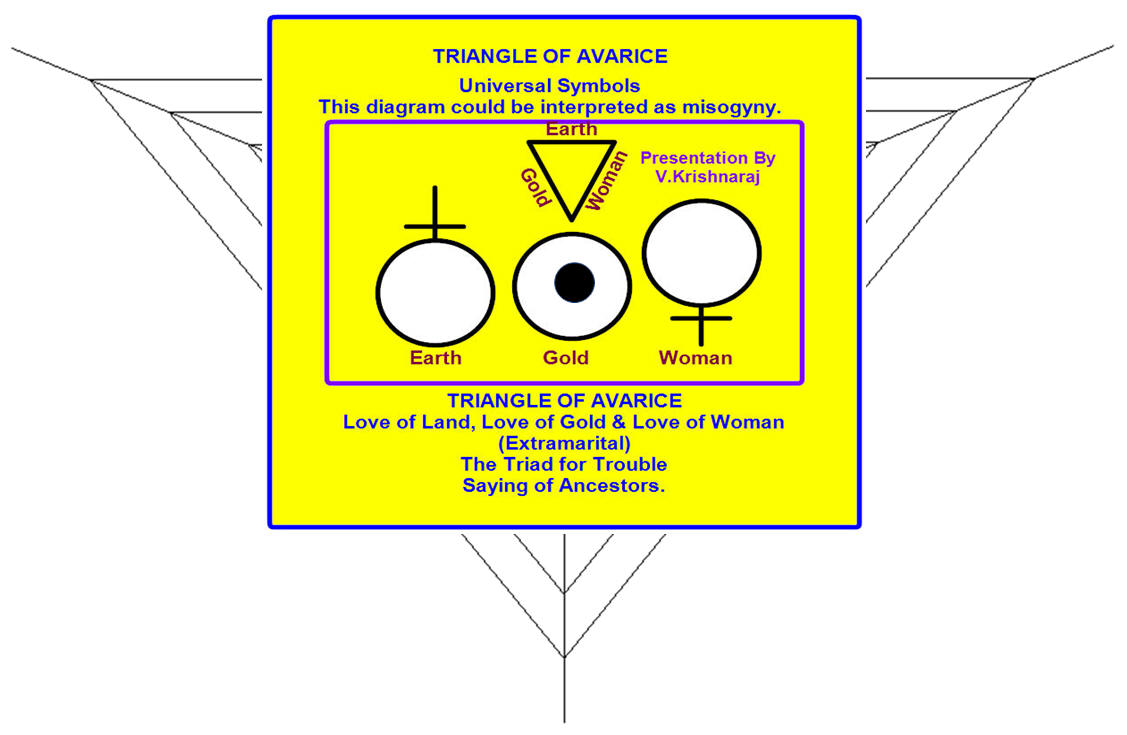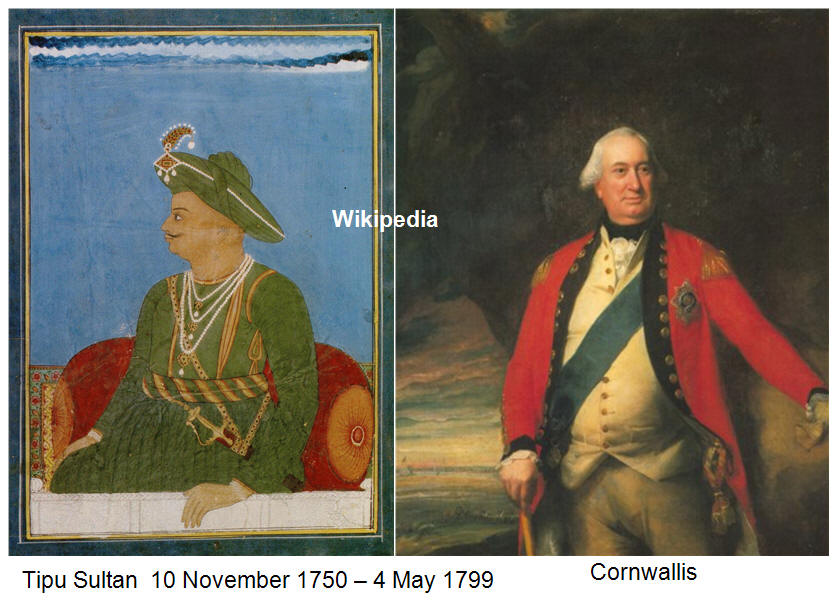Series 8
Tipu and his Turn… Sēvāratṉā Doctor T.S. Narayanaswamy.
Our ancestors have listed the three important causes of life’s everyday
problems and difficulties: Love of Land, Love of gold and Love of woman.
(In Tamil,
மண்,
பொன்,
பெண்
= Maṇ,
Poṉ,
Peṇ
are rhymers = Land, Gold, and Woman.)
Love of land and gold and consequent effects, Adharma (unrighteous)
gambling resulting in Kurukṣetra
war in Mahabharata are well-known. Coveting of the wife of Rama, going
to war only to lose the greatness, sustaining defeat and dying in the
war are the story of Ravana as depicted in Ramayana.
The three important causes of unhappiness are 1) Avarice of land, 2)
Avarice of gold, and 3) Avarice of woman
We are familiar with land and gold avarice, the untoward terrible
effects, and Adharmic gambling and their evil consequences in Kurukṣetra
war in Mahabharata. Lust
for a married woman leading to loss of all glories, defeat in war, and
ignominious death are well known story of Ravana in the Great Epic of
Ramayana.
Gold is the cause of robbery, murder… Though gold sells for Rs. 22,000
each sovereign (2014), people’s love for the gold is insatiable. The
mandatory dowry of gold jewels for the bride is the impediment and
problem for wedding.
We read in newspapers daily about the criminality associated with lust
for woman. Of all the crimes registered at the jail, a great percentage
are related to physical abuse of women.
In the name of service to the nation and people, some politicians are
engaged in anarchy and abuse of power.
If you throw a stone in a lake, the resulting circular waves spread to
the lakeshore. The problems are like that. In today’s world the common
problems of the families and people are inadequate income, the debt
burden, family disputes, poverty and suffering from lack of food,
clothing, housing… We drown in such difficulties, unable to cope.
Our ancestors though short on prosperity, lived a full life. Today’s
generation, though enjoying modern conveniences, always live in fear,
bereft of tranquillity. How could it be changed? The best way is to
bring out the great Sakthi of man, approaching the problems in orderly
manner, and finding solutions and success.
No fear of problems, analysis the causes and remedies, determination of
the approach to the problems, our intellect and life experiences: They
are not simple enough for resolution. Knowing the history of our
ancestors who faced such problems, their life events, and success in
resolving them serve us as a lighthouse.
Tipu Sultan the ruler of Mysore led the struggle in the fight for Indian
freedom. He was called The Tiger of Mysore, because he ruled his enclave
in an amicable manner with the capital in Srirangappattinam in Mysore
without a Hindu-Muslim divide. He was a challenge to the British rule.
The British could not capture Mysore during the first and second Mysore
war. When Lord Cornwallis was the Governor General towards the end of 18th
century, the third Mysore war began, and blood flowed in
Srirangappattinam. There were heavy losses on both sides. To stem the
loss, Tipu desired to have a peace treaty with the British. To prevent
further loss on their side, the British were ready to sign a peace
treaty with Tipu. Tipu ceded half his territory to the British besides
promising payment of war indemnity for 35 million rupees.
The British knew that the Tipu Treasury did not have 35 million rupees
because of the heavy losses from the two wars.
They also knew Tipu had no personal wealth amounting to the said
amount. The British calculated Sultan had no choice except to save
himself and spend a life ease by ceding the country.
Besides, it is an honor issue. It was an economic issue and surrender of
freedom of his country. Tipu’s decision would determine his and the
country’s future.
He had to give up one or the other to the British in his reply: It is
‘I’ versus ‘the country.’ Tipu created history by attacking the problem
from a third dimension and said he had a third option. He concentrated
his thought to the third dimension which took a life of its own.
Socrates said, ‘Time is an interval between two events.’ Tipu, a
polyglot of 14 languages and a scholar employed time as an instrument,
and determined to ask for a grace period for the restitution of losses
sustained by the British in the war. Tipu calculated if the opponent
exercised patience and trust during the grace period and if he came up
with an appropriate recompense, he was confident he would get the grace
period.
Tipu did not want his country to become a vassal state. He determined
with audacity to let Cornwallis take his two sons as hostages and a
guarantee of future payment.
The country and every household shed tears. The British could not refuse
the offer. The British thought wrongly that unable to meet the monetary
obligation and not wanting to be away from his children, Tipu quickly
would buckle under burden and
surrender the territory to the British. Their calculation went awry.
The Tipu subjects were brimming with love and gratitude to Tipu for
letting his children
taken hostage by Cornwallis to
save the country. They thought that their own children were taken
hostages. They worked hard to rescue them. The subjects played their
individual role to accumulate 35 million rupees. The subjects paid the
taxes on their own volition.
A surfeit of revenue graced the treasury. Thirty-five million
rupees were delivered to the British in a matter of one year. Tipu’s
children were released. The land prospered. The Royal house (all other
houses) were joyous.
Tipu’s shrewd calculus reigned supreme.
When solving a problem, sometimes new problems pop up. You might have to
sacrifice. When you put your plan to work with confidence, there is a
way to solve the original problem with others.
Tipu episode is a historical example: With a bold and different approach
and audacious self-confidence, we can find solutions to intractable
problems.
The tree will grow.
Country Bumpkin!
Often, whatever may be the problem, the victims are ordinary people with
nothing to do with the problem.
A teacher, a doctor, a lawyer, a priest, and a villager were waiting for
the bus at the bus stop near a four-road intersection. They had a
general conversation.
The lawyer pronounced, “I plead to win every case. If it is not for me,
the problems, the country faces, will grow.” The priest said, “I pray to
God for the welfare of all the people. That is the reason for the
prevalence of peace in the country.” The doctor boasted, “I save all
from diseases. Therefore, I am equal to God.” The teacher said with
pride, “I teach and improve the intellect of all. My service is
superior. Next to mother and father, the Guru comes, even before God.”
The villager presumed to be a country bumpkin by the four city slickers,
frustrated by listening to the ponderous and proud city folks, said,
“Listen gentleman, I am the one who cries, while you line your pockets
with my hard-earned money. Therefore, I am superior to all of you.”


